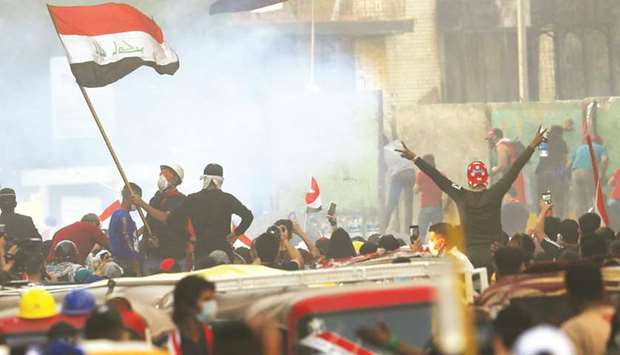Iraq will never be the same following the weeks of demonstrations in Baghdad and the country’s south demanding sweeping reform, its top cleric said yesterday in his most emphatic endorsement yet of the protest movement.
Grand Ayatollah Ali Sistani said authorities must respond quickly to the protests which have flooded the capital and cities across the south in an outpouring of anger over rampant corruption and lack of jobs.
“If those in power think that they can evade the benefits of real reform by stalling and procrastination, they are delusional,” Sistani said in his weekly sermon, delivered by a representative in the holy city of Karbala.
“What comes after these protests will not be the same as before, and they should be aware of that.”
Since starting on October 1, demonstrations have escalated into demands for root-and-branch reform of the political system.
Sistani cautiously backed the protests when they began but has since firmed up his support, describing protests yesterday as “the honourable way” to seek change.
The 89-year-old cleric, who is based in the holy city of Najaf and never appears in public, remains hugely influential in the south.
Emboldened after his sermon, thousands of protesters rallied in the southern hotspots of Kut, Hilla, Nasiriyah and Basra, AFP correspondents reported.
Near the capital’s main protest camp in Tahrir (Liberation) Square, demonstrators decided to hold their ground after hearing the religious leadership.
In neighbouring Khallani Square, two protesters were shot dead yesterday afternoon, according to a medical source, after one was killed overnight.
A third protester was killed later in the day in the square by a tear gas canister, the same source said.
More than 330 people have died since the rallies erupted, making them the deadliest grassroots movement to hit Iraq in years.
They present the biggest threat so far to the political system ushered in by the US-led invasion which toppled the regime of longtime dictator Saddam Hussein in 2003.
Protesters blame that system for rampant corruption, staggering unemployment rates and poor services in resource-rich Iraq, Opec’s second-biggest producer.
But the political establishment has rejected demands for the government to step down and instead closed ranks.
That consensus was brokered by neighbouring Iran’s pointman for Iraq, senior Islamic Revolutionary Guard Corps commander Major General Qasem Soleimani. Sistani denies being party to the deal and has warned outside powers against “imposing” anything on Iraq.
On Monday, he met the United Nations top official in Iraq, Jeanine Hennis-Plasschaert, to back her phased roadmap for tackling the crisis.
The plan calls for electoral reforms within two weeks followed by constitutional amendments and infrastructure legislation within three months.

Iraqi demonstrators take part in ongoing anti-government protests in Baghdad, yesterday.
